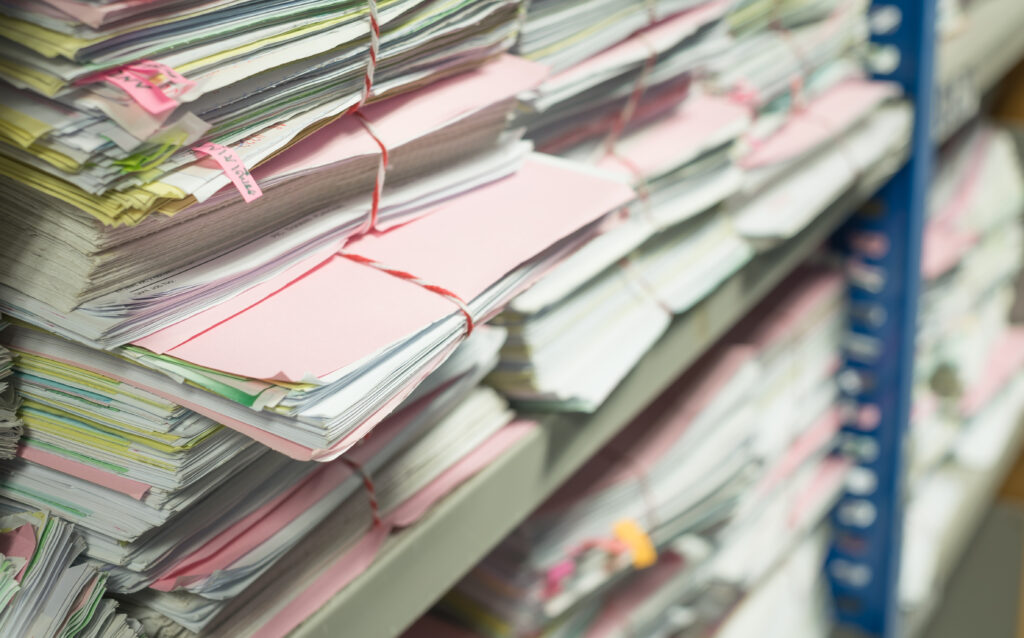The accumulation of old records and electronics is a common challenge for most organizations. While owners and managers realize that secure destruction is required at some point, they often put it off to deal with more immediate priorities.
Below are reasons the secure disposal of old records and electronics deserves immediate attention.
1. Keeping old records undermines an organization’s records retention policy.
An organization violates its own records retention policy if it permits records to exist beyond what is legally necessary. This puts an organization at a legal disadvantage in the event of future lawsuits or compliance audits where it will be important to legally establish that specific information is no longer available.
2. Old records and electronics pose a security threat.
The longer paper records and electronic devices are kept, the greater the possibility that they will end up doing harm to an organization.
It might be that an old laptop is taken from the storeroom because an employee decides no one cares (or no one is looking). Nobody is the wiser until the employee sells it on eBay months later and the company ends up in regulatory hot water.
When it comes to unnecessary paper records, it might be that a custodian who is cleaning out an aging warehouse illegally discards them in an open dumpster, or that those 200 boxes of records placed in an outbuilding 10 years ago are forgotten until a local investigative reporter is alerted to their existence.
These examples are not hypothetical. They occur in one form or another all the time.
3. Uncontrolled documents and outdated electronics make legal discovery far more difficult.
In any legal proceeding, a Discovery Order mandates that an organization turn over all information associated with the case. When old records (either paper or electronic) are stashed away in offices, backrooms, and self-storage facilities, there is significantly more information to review and the chances of missing something relevant are much greater. And woe to the organization that claims discoverable records are not available when it later comes to light that they are still around.
Even if this doesn’t happen, when the opposing party or the judge learns that a self-storage facility is full of long-lost documents or electronic equipment that could be even remotely relevant, the court will require that they be painstakingly searched. It can also lead to other significant repercussions, such as the jury being given instruction to assume there was an attempt to hide something (a.k.a. adverse inference).
The point is that legal discovery can become a nightmare when there are unnecessary accumulations of records and electronic equipment.
4. Accumulated old records and electronics violate new privacy laws.
Ten states have passed privacy laws that forbid organizations from retaining personal information longer than is necessary. Twice that many states are expected to do the same over the next few years. And since most old records and electronics contain personal information, retaining them longer than needed violates those regulations and could be grounds for fines and lawsuits.
Additionally, those same privacy regulations grant individuals the right to 1) have their personal information destroyed, 2) access all personal information maintained about them, and 3) know how their information is securely stored. Accumulating old records and electronics flies in the face of these new obligations, since compliance would be virtually impossible.
What to Do
There are three methods for reducing the danger posed by accumulated records and electronics.
- Don’t accumulate them in the first place. Employees should routinely be reminded of the dangers of obsolete and unmanaged documents, as well as old electronics, emphasizing the negative effects of their unwarranted buildup.
- Set up routine secure destruction as a method of disposing of records and devices that periodically accumulated.
- Make sure that the organization’s stored records are securely destroyed once a year according to a predetermined retention schedule.
Shred Vault® Can Help
Whether its weekly or monthly routine service, a large purge of old records, or the occasional secure destruction of outdated electronics, Shred Vault has a range of economical, convenient, and secure solutions that fit any budget and any situation.






